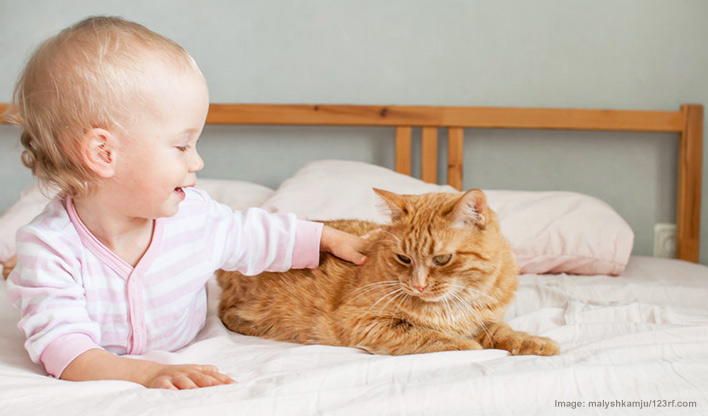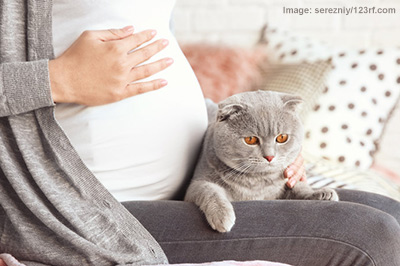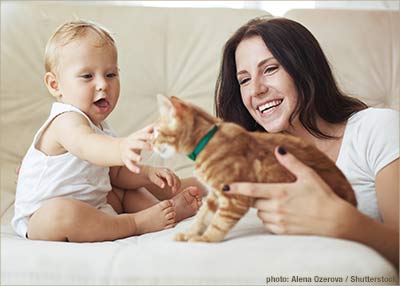Having a feline family member and a baby on the way is cause for celebration, not concern.
Cats not only benefit a baby's health and development, but with proper preparation they can live in harmony, and very possibly become best friends.

Changes within the home can be extremely stressful for cats, and there aren’t many changes bigger than bringing home a newborn baby. Sadly, this stress often leads to ‘undesirable’ behaviour that can result in owners giving up their cat. The good news is that there are things you can do to prepare your cat for the new addition to the family.
A study conducted by Cats Protection in 2018 found that 8% of parents or expectant parents did give up their cat, but 63% of these regretted their decision. Cats are part of the family and that same study found that 96% of people agreed that there were benefits to children growing up with cats.
Having a family pet can be a really positive part of a child's development; bonding with an animal leads to respect and care for them. Clinical studies also show that living with pets during the first year of life can boost a child's antibodies, lowering their risk of developing asthma and allergies.
If you are planning to expand your family, you'll want to make sure the feline member of your family is happy too. So, we’ve put together some practical tips for cat owners who are expecting a baby.
Before your baby arrives
 It's important to begin planning as early as possible to make the transition easy for you, your baby and your cat. Follow these tips to help prepare for your baby's arrival.
It's important to begin planning as early as possible to make the transition easy for you, your baby and your cat. Follow these tips to help prepare for your baby's arrival.
- If things in the house will be rearranged after the baby comes home, for example moving the litter tray or sleeping location, begin doing it 2-3 months prior so that your cat has plenty of time to get used to it.
- The same goes for routines; if feeding, grooming or play times will be affected, start adjusting this gradually a few months before your baby is due.
- Whilst you are pregnant, wear rubber gloves when emptying litter trays or gardening where cats might go to the toilet, to avoid any risk of contracting toxoplasmosis. You should also avoid eating cured or undercooked meats, and unpasteurised dairy products. More information is available from the NHS website.
- Babies make a lot of noise, and if your cat is unfamiliar with these strange sounds it may cause them some stress. Playing crying, gurgling and screaming noises will help them get used to it; start very quiet and gradually increase the volume each day to the natural level of a real baby crying, so that these sounds become familiar. Download Cats Protection’s ‘Baby Crying’ MP3.
- Build your nursery furniture well in advance, and give your cat a chance to explore everything. You can rub a soft cloth on your cat's head and then on the new furniture to help make everything smell more familiar to them. If there are items you do not want your cat to sit or sleep in/on make sure these are kept out of reach.
- Cats have a really great sense of smell and there will be lots of new products when the baby comes. Start using things like shampoo, soap, baby powder and lotion on yourself to mix these smells with your own ‘safe’ scent to help them get used to them.
- Make sure your cat’s flea, worm and other treatments are kept up to date to avoid any contamination or additional stress. Also, ensure that your cat's vaccinations are up to date and that they are neutered.
- If you need to remain in hospital for a while after the birth - ask someone to take a blanket or piece of clothing that smells of your baby home, so that your cat can get used to their scent in advance.
After baby comes home
You’re going to have plenty of other things on your mind when you first come home from the hospital. Be prepared by following these tips to keep both your baby, and your cat safe and happy.
- When your baby is sleeping, keep the door to the nursery closed, or try adding a screen door, so your cat can’t sneak in to investigate. Do not leave them together unattended.
- Try using a pheromone diffuser such as Feliway (Link to Feliway here) to keep your cat calm during this transition period.
- Make time to fuss your cat as they will probably be feeling a bit jealous, but give them space if they seem like they are getting agitated.
- Keep baby and cat toys separate - they are often made of similar materials but you shouldn’t let your cat play with your babies toys and vice versa.
- Also keep baby food and cat food separate to prevent cross-contamination.
Introducing your cat to your new baby
 When you’re ready to let your cat say hello to your newborn, follow these steps so that introductions run as smoothly as possible.
When you’re ready to let your cat say hello to your newborn, follow these steps so that introductions run as smoothly as possible.
- Choose a quiet and neutral space, not where your cat usually eats or sleeps.
- Hold the baby and let your cat have a gentle sniff, to get familiar with the new scent.
- If your cat is acting calmly, reward them with praise and treats.
- Do not force an interaction, if your cat runs away or loses interest try again another time.
- Make sure your cat has somewhere that they can escape to, such as a cat tower or furniture which is out of baby’s reach.
If you follow these steps but still notice changes in your cat’s behaviour like staying away from home, hiding more than usual, scratching, spraying or being aggressive, speak to a vet or a cat behaviourist to find out what other steps you can take to resolve any issues.
As your baby grows up and becomes more mobile, they will probably take more of an interest in your cat, and try and grab them. Teach your baby early on the importance of being gentle to your cat. It’s equally important that your cat has a safe, quiet place to rest and relax which is inaccessible to your little one. Once your baby begins crawling ensure that cat food and litter trays are kept out of her reach.
Some people may encourage you to rehome your cat before you’ve even had your baby, but your cat is an important part of the family. With proper preparation and patience, your cat and baby can live in harmony, and very possibly become best friends.
Check out this lovely video on YouTube, of a baby and cat growing up together. It’s a great example of how careful, calm and supervised introductions have resulted in a beautiful cat-and-child friendship: Baby And Cat Grow Up Together!
Further Reading
Cats Protection - Cats and babies
Cats Protection – Cats & pregnant women
Blue Cross - How to introduce your cat to your baby
Battersea - Introducing new baby to cat
Contributor: Ella Street, Cat Chat Blogger
Published: August 2021

